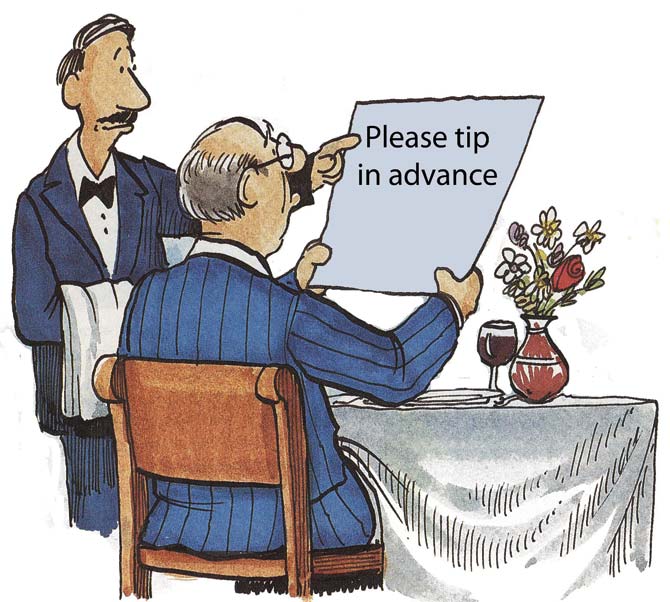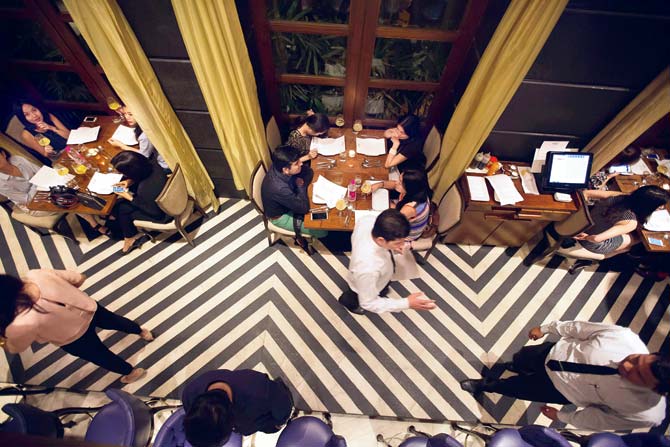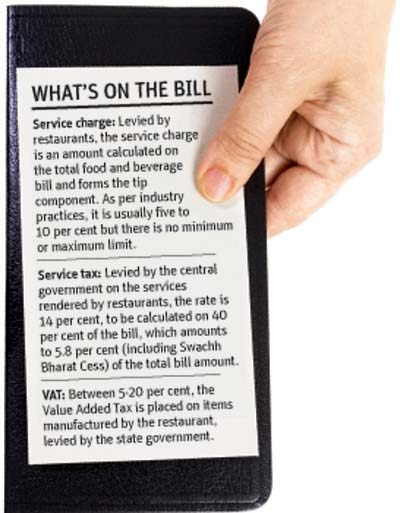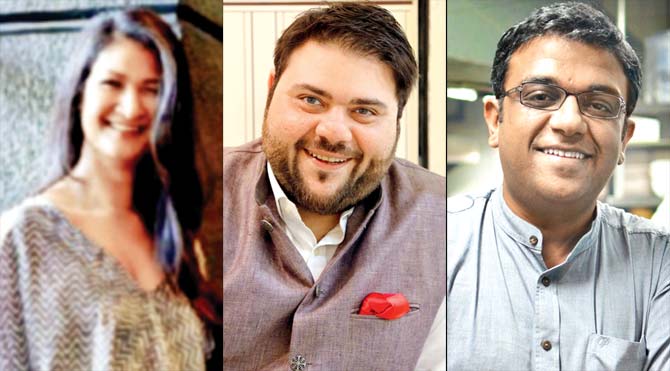As a Colaba fine-dine makes news by knocking service charge off its bill, industry experts wonder if the move will work

![]() In November last year, Danny Meyer, the reputed head honcho of New York-based Union Square Hospitality Group caused a stir when he announced a no-tipping (a quintessential American practice) policy at all the 13 establishments including the fine-dine haute spot, The Modern located inside MoMA near Central Park.
In November last year, Danny Meyer, the reputed head honcho of New York-based Union Square Hospitality Group caused a stir when he announced a no-tipping (a quintessential American practice) policy at all the 13 establishments including the fine-dine haute spot, The Modern located inside MoMA near Central Park.
ADVERTISEMENT
A trailblazer on the NYC restaurant scene, Meyer — who had also launched Tabla, where homebred chef Floyd Cardoz rose to fame — introduced the policy to bring wage parity between servers and non-serving staff. In a New York Times interview, he stated that during his 30 years in the business, dining room pay had increased by 200 per cent while the kitchen income grew no more than 25 per cent.

Closer home, on April 24, The Table at Colaba did away with its Indian equivalent, the 10 percent service charge that the restaurant levied since January 2011. Gauri Devidayal, partner at the restaurant, justifies, "We received feedback from several diners that they do not wish to be forced to tip and that restaurants should compensate staff adequately, irrespective of it. Accordingly, we have now revised menu prices to adequately compensate staff without depending on any additional service charge or tip. The tip is now entirely left to the guest's discretion based on their dining experience."
When we ask if the revised menu will hurt diners' pockets, Devidayal breaks down the numbers: "Menu prices have increased by approximately 10 per cent to factor in the increased staff cost as a result of eliminating service charge. Accordingly, the net bill amount, after taxes, should remain the same. For example, if earlier, the bill was '1,000 (food and beverage) plus '100 (service charge) plus service tax, now it will be '1,100 (food and beverage) plus service tax."

Diners at The Table in Colaba
But is the move viable for Mumbai's restaurants? Riyaaz Amlani, CEO and MD at Impresario Entertainment and Hospitality, and the president of National Restaurant Association of India (NRAI), doesn't think so. "A guest who pays '500 for an appetiser may not mind spending 10 or 20 rupees more for it now but for many value-based restaurants, adding a service charge makes sense because then, a restaurant can offer honest pricing for its food and beverage." A case in point, the owners of Dishkiyaoon, the latest addition to the burgeoning dining options in BKC, had contemplated going the Meyer way when they opened two weeks ago. "But we felt that Indian diners are value conscious and still coming to terms with service charge that is actually shared by the unseen workforce too. Factoring it into our prices could backfire," says partner Gaurav Dabrai. The restaurant levies 10 percent service charge, a standard industry practice, on the bill.
Tip vs service charge
A variable component in the staff's monthly compensation, the service charge, levied on the bills, is usually pooled in and distributed among both, front-of-house and back-end workers vis-à-vis a tip which would only be pocketed by waiters. For instance, at Hotel Jewel Of Chembur, the service charge earnings from its three restaurants, Le Café, Astrix and Moksha, are distributed among kitchen staff, utility workers and housekeeping too. "If the service charge is eliminated, their salaries would need to be doubled," says outlet manager Rajiv Gugnani, hinting at the 100 per cent hike in the staff earnings, thanks to the levied component.

In 1999, when Mitesh Rangras, the director of SID Hospitality (Lemon Leaf and Soy Street among others) started his career in hospitality, most restaurants and hotels would only distribute the tips to the F&B service staff. "The kitchen guys would find it tough to make a living on their wages. Thankfully, times have changed," says Rangras, who incorporated the service charge at his restaurants, a few years post opening them. "We couldn't compete with restaurants who were offering it to the staff in terms of the overall package. We couldn't attract the right talent. It has now become a very important part of the final salary the staff draws," he admits. Pankil Shah, co-owner of Neighbourhood Hospitality, seconds, "Nowadays, staffers ask about service charge before they join the restaurant. The amount often plays a deciding factor because it constitutes 15-20 per cent of their total earnings."
He adds, "The tips would only be about five to eight per cent." At restaurants like Copa, Silver Beach Café and Nom Nom that fall under the Silver Beach Entertainment and Hospitality, the service charge increases a staffer's salary by almost 30 to 40 per cent. "It certainly is something that motivates the staff to achieve sales targets, which results in efficient working and service. It's as simple as — the better the sales, the better the staff pay," says director Hitesh Keswani.
At many restaurants, a small percentage of the service charge is also reserved for staff welfare and contingency fund. Amlani points out, "The tips would be pocketed only by waiters and usually mean parallel economy but if you pay service charge, the income is taxed and everything is on the board and clean." So, in the absence of a service charge how does The Table plan to compensate the staffers? "We will continue to pay them a fixed and variable salary. The variable salary (previously the distribution of service charge) will now be calculated as approximately 10 per cent of the gross sales of the restaurant," informs Devidayal.
Is there an alternative?
Most industry insiders feel that 10 per cent service charge is considered a safe and healthy practice too but it could turn into a cause of concern if the amount is hiked. "Restaurants in the US charge 18 to 20 per cent service charge and honestly, if unregulated, Indian restaurants may do the same. Instead of being mandatory, the restaurants should provide suggestions to choose from, at 8, 10 and 12 per cent. Also, students who are not earning yet should not be charged," believes Aayush Agrawal, director of the self-service QSR chain, Wok Express that doesn't levy a service charge.

Gauri Devidayal, Riyaaz Amlani and Mitesh Rangras
Parbai provides an alternative option: "An introduction of a reward system linked to efficiency of staff not just in serving the guests well but also keeping costs, wastage and breakage under check to add value not only to the guest's experience but also to the functioning of the organisation. However, defining the parameters would require serious thought."
Rangras sums it up, "The staff members work hard to provide the kind of service and in the super low margin restaurant business, it is tough. As a company, we had tried a profit-sharing option with our staff, but unfortunately, we had to discontinue it, as people didn't understand what and why it was being done. They thought of it as another allowance (we still do it at the top level and all managers and chefs are a part of it). The quality and availability of staff is deteriorating every day. It's a high-stress job, service charge is just another incentive for staff."
 Subscribe today by clicking the link and stay updated with the latest news!" Click here!
Subscribe today by clicking the link and stay updated with the latest news!" Click here!






